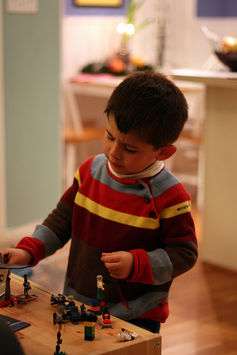Study reveals autism treatment clues

Young autistic children who can spontaneously imitate adults and use objects in a functional way may be more likely to respond well to a therapy called the Early Start Denver Model, new research shows.
The Early Start Denver Model uses play to teach social skills like taking turns to autistic pre-school children but its success varies greatly from child to child.
In an effort to unpack why some children do better than others, a research team that included La Trobe University scientists studied a group of 21 autistic children aged between two and five years as they progressed through an Early Start Denver Model program.
"These are very early results but all the children did better after 12 months than they did before the treatment and we saw some children doing way better than other children," said lead researcher, Dr Giacomo Vivanti, from La Trobe University's School of Psychological Science.
Further tests revealed that those children who did better were the ones who were able to use objects for their designed purpose.
"For example, a child who sees pieces of Lego and will use those pieces to build something—who uses the objects in a direct functional way—were doing better than children who will start banging the Lego against the wall," he said.
Another clue that a child was likely to respond well to the treatment was their ability to spontaneously imitate adult behaviour as part of a game.
The study was also the first time researchers showed that the Early Start Denver Model, which is normally administered one-on-one with children, could work in a group setting.
"One-on-one has proved to be effective but it's a very expensive model. We wanted to know if there was a way to replicate it in a community based setting," said Dr Vivanti.
"There needs to be caution around the fact that we still need more detail about the efficacy of the program. These are encouraging results but we need to replicate the results with a control group."
A better understanding of how different treatments affect different children could help children get the therapies best suited to their needs, he said.
Dr Vivanti's findings, which were published in the Journal of Autism and Developmental Disorders, will be presented this week at the Australasian Society for Autism Research conference underway in Sydney this week.
Dr Jon Brock, an autism expert from the Centre of Excellence in Cognition and its Disorders and one of the conference organisers, described Dr Vivanti's findings as very interesting.
"The study shows that kids do vary a huge amount in how much they improve over the year they're in the Early Start Denver Model program and it suggests that there might be ways of predicting in advance which kids are likely to improve," he said.
"However, the findings are quite preliminary. It's difficult to know how much of the improvement a child shows is directly due to the intervention. And we don't know whether the kids who showed less improvement would have been better off with a different intervention."
"These are really important questions to answer because this kind of intervention is a huge commitment for everyone involved – so we need to know that kids are getting the intervention that is most appropriate for them as individuals."
More information: link.springer.com/article/10.1 … 07/s10803-012-1705-7
This story is published courtesy of the The Conversation (under Creative Commons-Attribution/No derivatives).















